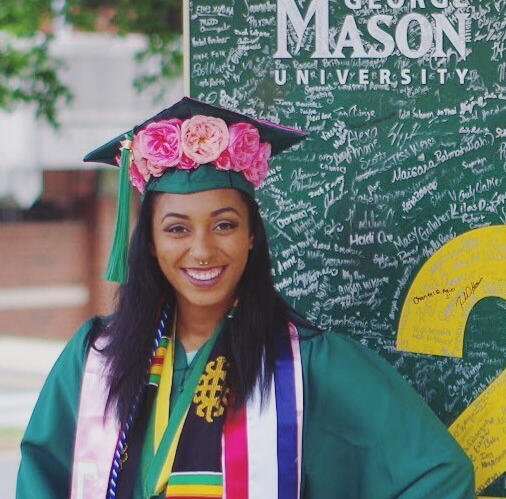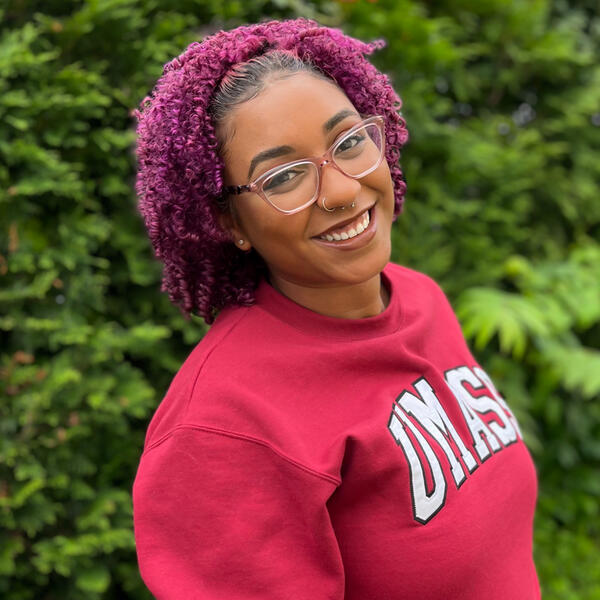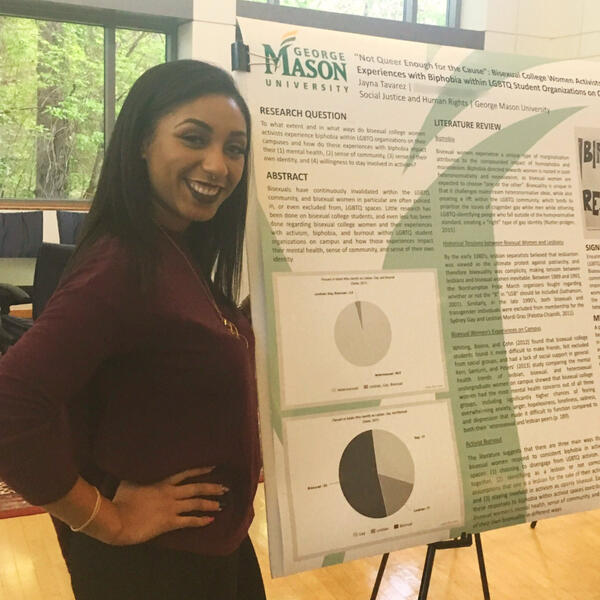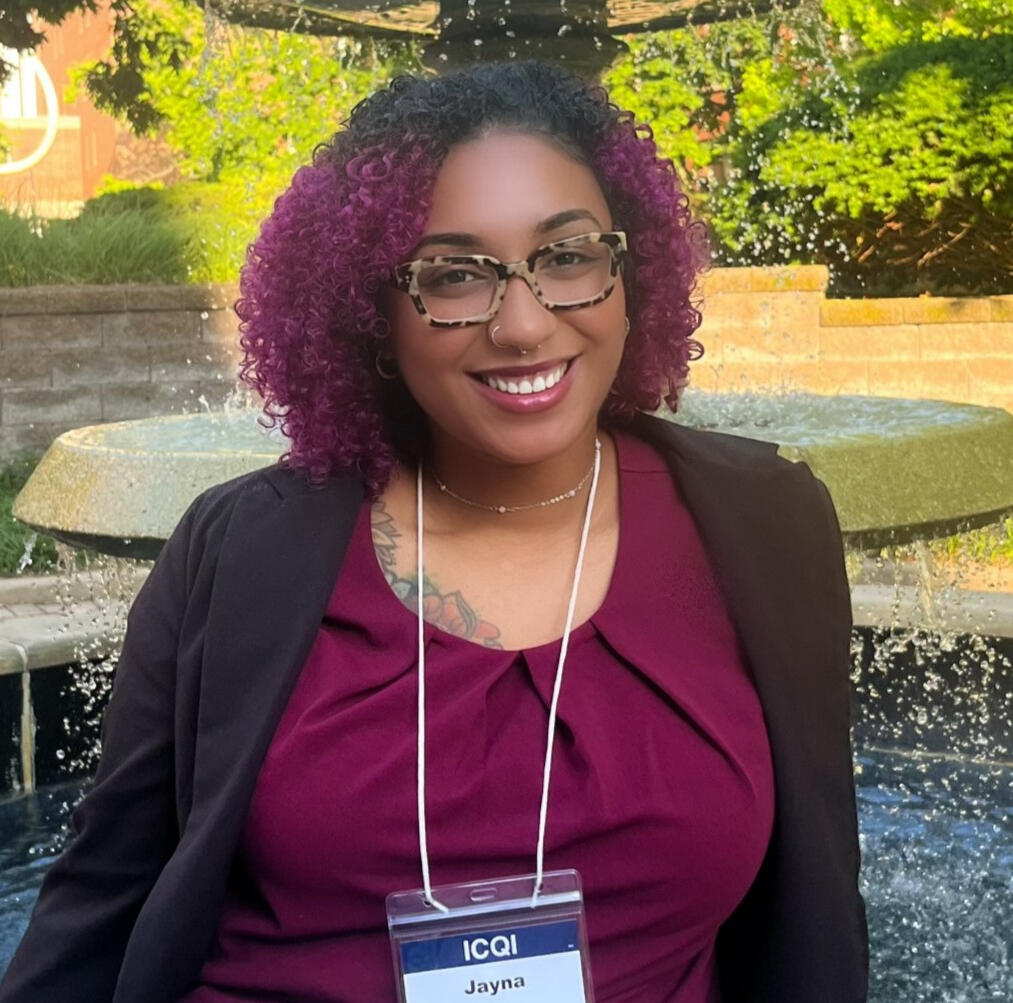Welcome! I’m Jayna – a scholar, educator, and practitioner, and second year PhD student at the University of Massachusetts Amherst. My work is grounded in performance studies, queer and women of color feminist theories, and personal narrative/autoethnography as method. My interests are concerned with questions of power, identity, embodied experience, and social justice particularly within institutions of higher education. My lens, as a scholar, educator, and practitioner, is deeply informed by my commitment to supporting holistic student success within and outside of the classroom, cultivated by my years of college classroom teaching and full-time student affairs experience. To learn more about me, please browse my website, connect with me on LinkedIn, or use the contact form. I look forward to connecting!
EDUCATION
I am a proud alumna of George Mason University, where my deep commitment to social justice and anti-oppression advocacy, education, and scholarship began. In May 2016, I earned a Bachelor of Arts (BA) in Integrative Studies with a focus on Social Justice and Human Rights and a minor in English. I continued in the program and two years later, earned a Master of Arts (MA) in Interdisciplinary Studies with a focus in Social Justice and Human Rights, supplemented with a Graduate Certificate in Women and Gender Studies. With the support of Dr. Paul Gorski, Dr. Angela Hattery, and Dr. Rachel Lewis, my research examined the experiences of bisexual college students engaged in LGBTQ spaces on campus.I am a current student at the University of Massachusetts Amherst, pursuing an Education Specialist (EdS) degree in Social Justice Education, a Doctorate of Philosophy (PhD) in Communication, and a Graduate Certificate in Feminist Studies.
Awards
Research Enhancement and Leadership (REAL) Fellowship, 2024
Office of Inclusion and Engagement, University of Massachusetts AmherstCollege of Humanities and Social Sciences Distinguished Alumni Award, 2018
Department of Women and Gender Studies, George Mason University



RESEARCH
My research topics vary broadly, from examining the experiences of bisexual college students to understanding classroom dynamics in the feminist classroom. Ultimately, my research questions and interests are situated at the intersection of critical pedagogy, cultural studies, and performance, undergirded by questions of power, identity, embodied experience, and social justice. My work relies on critical research methods, such as performance auto/ethnography, personal narrative and storytelling, and other creative techniques that prioritize the embodied experience of the phenomena I am studying.At this time, my peer-reviewed work can be found in the Journal of Diversity in Higher Education and the Journal of LGBT Youth. To read my work, follow me on Google Scholar or ORCID.
Peer-Reviewed Work
Tavarez, J. C. (2024). Reflexive interventions: From damage-centered to desire-based bisexuality research. Journal of LGBT Youth, 1-20.Tavarez, J. C. (2023). “Bisexuality’s never enough…”: Using composite narratives to explore bisexual students’ experiences within LGBTQ campus spaces. Journal of LGBT Youth, 1-20.Tavarez, J. C. (2022). “There’s people out there doing more than me…”: Activist burnout among bisexual college students within LGBTQ campus spaces. Journal of Diversity in Higher Education.Tavarez, J. C. (2022). “I can't quite be myself”: Bisexual-specific minority stress within LGBTQ campus spaces. Journal of Diversity in Higher Education, 15(2), 167–177.
Conference Presentations
From damage-centered to desire-based bisexuality research. LGBTQ Research Symposium, Virtual Conference hosted by the University of Kentucky and the University of Connecticut. June 2024.Moments like this: A collaborative performance autoethnography on solidarity’s failures and possibilities. International Conference for Qualitative Inquiry (ICQI), University of Illinois Urbana-Champaign, Urbana-Champaign, IL. May 2024.Not queer enough for the cause: Bisexual college women’s experiences in LGBTQ spaces on campus. Women and Gender Studies Graduation Symposium, George Mason University, Fairfax, VA. May 2018.Creating bi-inclusive campuses: Bisexual women's experiences with biphobia in LGBTQ campus spaces. Women and Gender Studies Annual Conference, George Mason University, Fairfax, VA. April 2017.Intersectional identities and burnout in LGBTQ student activists of color. Intricate Identities Conference. Gallaudet University, Washington, D.C. November 2016.Pick a side? Nope! Biphobia within the LGBTQ community. Intricate Identities Conference, Gallaudet University, Washington, D.C. November 2016.
Awards
Outstanding Student Paper Award, LGBTQ Research Symposium (2024)
University of Kansas; University of ConnecticutOutstanding Student Paper Award, LGBTQ Research Symposium (2019)
University of Illinois Urbana-Champaign
TEACHING
I have been in the classroom teaching in some capacity since I was an undergraduate student. At George Mason University, I served as a Teaching Assistant for several interdisciplinary classes (INTS 395 Explorations of Gender and Sexuality; INTS 337 Social Justice Consciousness; SOCI 395 LGBTQ Mental Health and Wellbeing).In my role as a student affairs educator within the Department of Residential Life at UMass, my courses focused on cultivating student leadership through a deeper understanding of diversity, equity, and inclusion for. I taught, and later came to redevelop and serve as the Course Coordinator for EDUC 391R: Creating Opportunities for Residents to Engage, a pre-employment class for prospective student staff. I also developed and served as the Course Coordinator for EDUC 396D, a required course for EDUC 391R undergraduate Teaching Assistants, focused on developing skills around peer facilitation, inclusive classroom practices, and dialogue across differences.As a PhD student in the Department of Communication, I served as a Teaching Assistant for two Communication courses (COMM 125 Introduction to Rhetoric and Performance Studies; COMM 140 Introduction to Film Studies). During the Fall 2024 semester, I will be teaching a course for first-year students in the Communication major as part of the Residential Academic Program for the Office of Student Success.
Courses Designed
COMM 125: Introduction to Rhetoric and Performance
Residential Academic Program, Fall 2024
WORK EXPERIENCE
My five years as a full-time student affairs professional has allowed me to work closely with undergraduate college students, providing me a deep understanding of their personal, social, and academic needs (within and outside of the classroom), and has made me a more well-rounded educator and pedagogue.My time in Residential Life especially has sharpened my skills in undergraduate and graduate staff supervision, residential curriculum and student learning in the residence halls, on-site and front-line crisis response, support, and referrals around highly complex student issues, such as sexual misconduct, alcohol and drug related behavior, mental health concerns, bias incidents, and conflict management.Additionally, student affairs work has provided me with many opportunities to sharpen my curriculum development skills that serve me well in my teaching, training, and facilitation practice, particularly in topics of diversity, equity, inclusion, and social justice.
TRAINING AND FACILITATION
I am a skilled trainer and facilitator in topics of diversity, equity, inclusion, and inclusive pedagogy. My training philosophy and facilitation style bridges my work within academic affairs and student affairs.I have created, designed, presented and facilitated trainings, presentations, and activities, in-person and remotely, for undergraduate and graduate student staff, as well as professional staff, on a variety of DEI topics. Some of the topics I have created and facilitated training about include: white supremacy and anti-racism; identity and intersectionality; privilege and oppression; the cycle of socialization and liberation; student leadership and social change; and inclusive pedagogy and facilitation.
Teaching Workshops
Engaging Emotions in the Classroom (2024)
Teaching Academy, University of Massachusetts AmherstOften, we are taught that expressing emotions is inappropriate for the classroom. But engaging in social justice conversations, with words like “injustice,” “oppression,” and “privilege,” can evoke big feelings in students. Anticipating reactions like anger, resistance, shame, guilt, and sadness can make us uneasy, discouraging us from starting the conversation. But what if engaging in these emotions can actually help deepen students’ learning? In this workshop, I draw from embodied pedagogies to discuss some of the most common responses that arise during social justice conversations and contemplative tools to engage with, rather than ignore or avoid, these emotions.This workshop ranges from 75 minutes to 90 minutes, and can be facilitated in person or remotely via Zoom.
CONNECT
Whether you’d like to learn more about the trainings I offer, collaborate on a research project, or chat about graduate student life, I would love to connect ! Feel free to use the contact form to send me an email, or connect with me on social media, such as LinkedIn!

